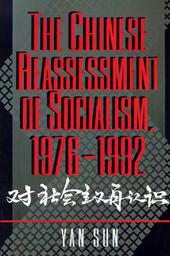
|
The Chinese Reassessment of Socialism, 1976-1992
Paperback / softback
Main Details
| Title |
The Chinese Reassessment of Socialism, 1976-1992
|
| Authors and Contributors |
By (author) Yan Sun
|
| Physical Properties |
| Format:Paperback / softback | | Pages:376 | | Dimensions(mm): Height 254,Width 197 |
|
| ISBN/Barcode |
9780691029986
|
| Classifications | Dewey:320.5310951 |
|---|
| Audience | | Professional & Vocational | | Tertiary Education (US: College) | |
|---|
| Illustrations |
2 tables
|
|
Publishing Details |
| Publisher |
Princeton University Press
|
| Imprint |
Princeton University Press
|
| Publication Date |
10 September 1995 |
| Publication Country |
United States
|
Description
Since the late 1970s, a debate has been unfolding in China concerning the merits of socialism as a philosophy of social justice and as a programme for national development. Just as Deng Xiaoping's better advertised experiment with market-based reforms has challenged Marxist-Leninist dogma on economic policy, the years since the death of Mao Zedong have seen a profound re-examination of a more basic question: to what extent are the root problems of the system due to Chinese socialism and Marxism generally? This book presents a systematic study of post-Mao reappraisal of China's socialist theory and practice. Rejecting an assumption often made in the West, that Chinese socialist thought has little bearing on politics and policymaking, this book takes the argument of the post-Mao era seriously on their own terms. It identifies the major factors in the debate, reveals the interplay among official and unofficial forces, and charts the development of the debate from an initially parochial concern with problems raised by Chinese practice to a grand critique of the theory of socialism itself. The book concludes with a comparison of the reassessments undertaken by Deng Xiaoping with those o
Author Biography
Yan Sun is Assistant Professor of Political Science at Queens College of the City University of New York.
Reviews"The book helps us to better understand the ideological dimension of the post-Mao reform movement in China. It sheds new light on the reasons for China's successful economic development without democratization and is a much-needed addition to the existing literature on contemporary China."--Perspectives on Political Science
|